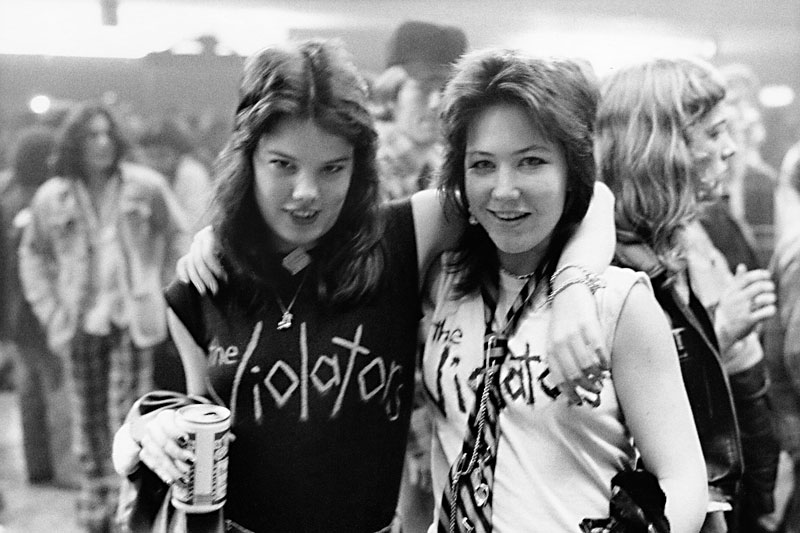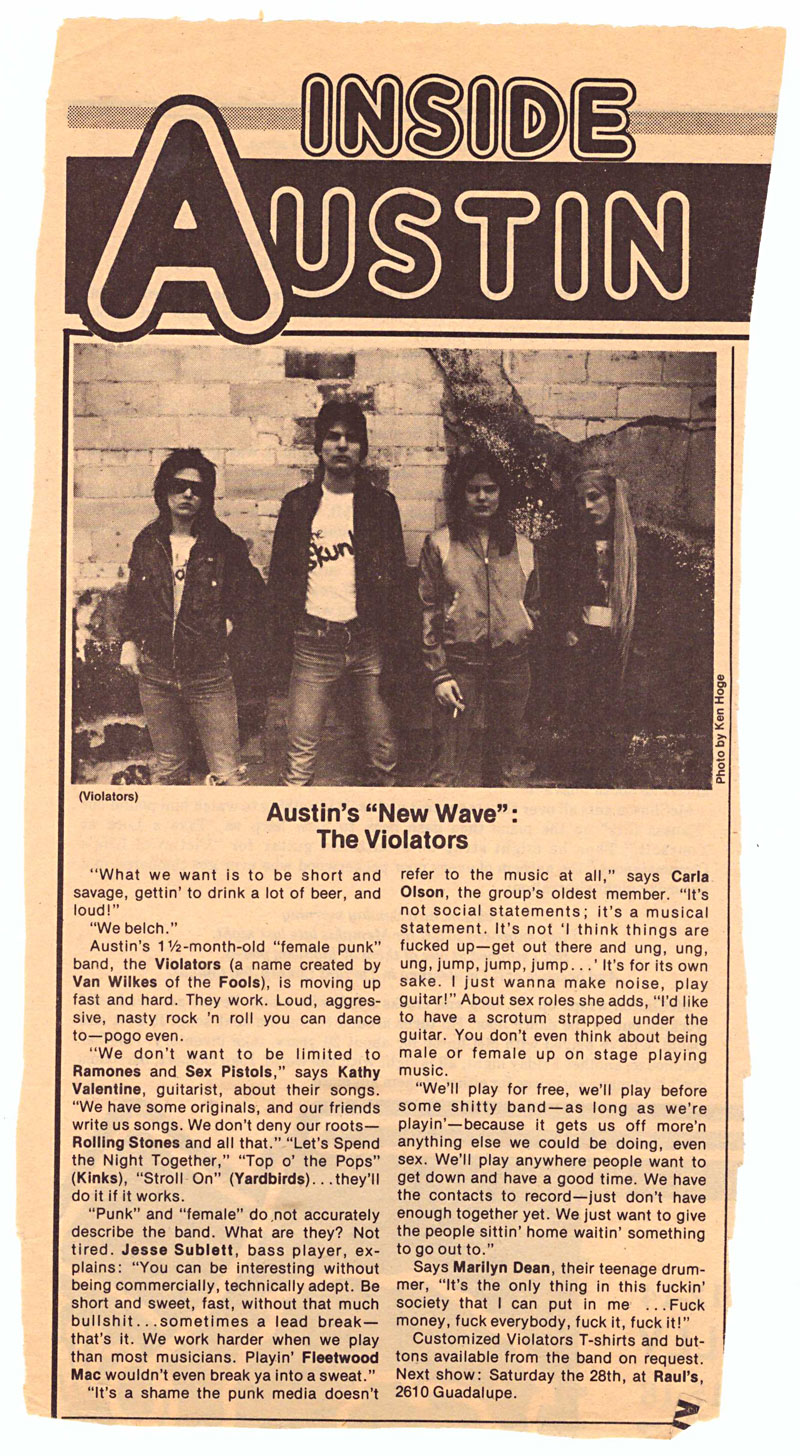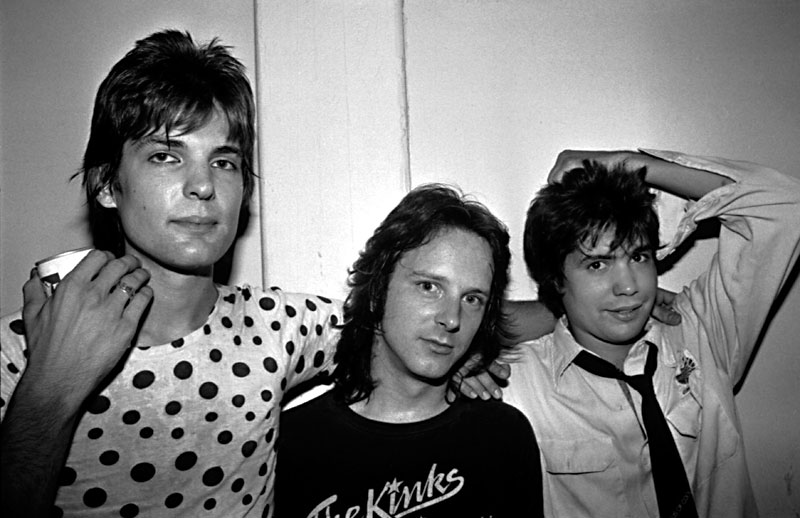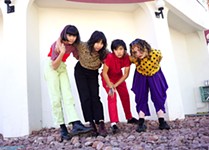Austin Punk Chronicles: "Hard, Fast & Unapologetic" – Raul's Shifts Into Fourth Gear
In the wake of the one-night debut of the Skunks and the Violators, Austin punk begins in earnest in Chapter 5, Part 2 of the "Austin Punk Chronicles"
By Tim Stegall, Fri., Aug. 12, 2022
Editor’s note: This is Chapter 5, Part 2 of a serialized history of Austin punk by veteran writer and punk musician Tim Stegall. You can read past installments of the “Austin Punk Chronicles” here.
"It Ain't About Playing the Right Chords, for a Start!"
"I thought punk music, for the most part, was pretty crappy," says Skunks drummer Billy Blackmon in his nicotine-cured drawl. "But I liked the fact that it was simple and it was back to the roots of rock & roll, stuff that kids could play. None of us were great musicians. We weren't Eric Johnson or somebody like that. We weren't on that level, and we had no pretensions of playing like that.
"We were very hard, we were very fast, and we were very unapologetic," he adds. "Because at that time, music was Elton John and Queen. It was very overproduced, and it was very schlocky. Not all of it was bad, but there just wasn't any bare-bones rock & roll that the kids could play."
"It ain't about playing the right chords, for a start!" the Clash's Joe Strummer snarled in 1979 at an American TV newscaster who had the nerve to ask him what punk was about, as if it were the most obvious thing in the world. In reality, it took at least some modicum of skill in order to play punk rock in a manner that rose above the faceless leather-jacketed hordes. Otherwise, you matched the sneers of "proper" musicians that "those guys can't play." But you didn't want to be too good, lest you alienate your audience.
"Proficiency could work against you, in some ways," muses the Violators' Carla Olson, quite a skilled guitarist in her own right. "Because if you were too proficient, it was considered boring. You really didn't wanna show all your licks, because then you weren't considered hip."
"We were green, too," adds Skunks guitarist Eddie Muñoz. "It actually worked for us, because we had the confidence to overplay and stuff, you know, and we had a great drummer. He filled all the holes and gave the cues and stuff."
"What we knew, we played the hell out of," affirms his bass-thumping bandmate Jesse Sublett.
"Yeah, a year before, you weren't that good," Muñoz grins at his bandmate. "But cranking it out with a really good drummer, you got really good at doing all these runs and stuff. It inspired you, man. That was some inspired shit."
"I had never played with a good drummer before Billy," affirms Sublett.
"He kicked your ass, he kicked my ass," smiles Muñoz. "I mean he could hear me coming. He could tell the kind of accent I was going to play and he would just do it."
"None of us were great musicians," snorts Blackmon. "It was about energy."
Sublett, at least in those days, did not see the Skunks as a punk band. "I saw us as a glorified garage band with ambitions for greatness," he wrote in 2004 memoir Never the Same Again. When Joe Nick Patoski profiled them for the Austin American-Statesmen in September 1978, Sublett sneered, "People who know what we're like, those who've heard us and still think we're punks – that's dumb. We're just a rock & roll band."
But surely a diamond-hard rock & roll band with bags of energy, Nuggets tendencies, a few Stooges covers, and a brace of originals that sound like Lou Reed outtakes is one definition of "punk rock," isn't it? Lo-fi recordings from perhaps the Skunks' second gig show them possessing enough power to fuel several industrial generators. Blackmon bashes ferociously, skillfully. Sublett gets off some nimble basslines, drawling the whole way like some long-lost South Texan cousin of Lou Reed. And Muñoz rips like the second coming of the Stooges' James Williamson, letting loose all this crazed, gibbering voltage.
As for their 01/28/78 bill mates, the Violators? "The Violators were very young kids," says Blackmon. "Marilyn was like 16, Kathy was 16, Carla was probably 21. Jesse was probably the best musician in that band, off the top of my head. Carla was good. They were just kids playing fast English punk music. Those were our influences at that time."

"Momma, What's a Punk?"
"We did a few of those Skunks/Violators double bills, until we could do it on our own and the Violators could also play their own show," says Muñoz. "The double draw bill really built up an audience for both bands."
The January 28 bill established the punk beachhead at Raul's. It also brought in two different demographics, who weren't always mutually exclusive: 1) future musicians and bandleaders; and 2) Radio-Television-Film majors from the University of Texas, just across the street.
"A whole lot of people started because of us," says Sublett. "I dunno how many times I heard that. It was quite an honor."
"That's when the punk rockers from RTF started coming over," affirms Muñoz. "Then the scene developed even better and it got cooler. Of course, the RTF students want to latch on to anything that's halfway arty, so they latched on to the punk thing. A whole lot of creatives came out of that program. It was really good obviously, because the technology was so primitive that people were forced to stretch their imaginations."
"Getting the Bodysnatchers involved was really cool, too, because they were a lot of fun," he adds.
Enter Austin's Third Punk Band: the Bodysnatchers, composed of a coterie of musicians from Abilene who'd all migrated to the River City in "'68/'69/'70," according to guitarist Tom McMahon.
"I did all the wild stuff, the soloing and feedback and smashing things," he quips.
McMahon, singer Larry James, "tenor" bassist Kyle Brock (also in the Electromagnets, another group of displaced Abilenians, aside from guitarist Eric Johnson), second bassist(!!) Jimmy Pettit, and brothers Chris Bailey on guitar and Ian on drums played "sharp, hard-edged blues things" from the harder British Invasion outfits like the Yardbirds and the rowdier early UK psychedelia from the Creation, "six to nine months before the Sex Pistols happened." A chance trip by McMahon to the 7-11 at 38th and North Lamar pointed them in the new direction.
"I was looking in the magazine rack, and I saw a magazine that said, 'Punk Rock!'" he says. "It had all these guys who looked really bizarre – their hair was sticking out in spikes all over the place, and they were all taped up, their guitars were taped up. They had plastic wrap all around them. It was Richard Hell & the Voidoids on the cover. And I looked through the magazine, and it was a whole new look and attitude. It was fresh, and I like to tear things up!"
He brought the mag to band practice, and the spiky, jagged visuals and outsider attitude held the same appeal. Seeing the Pistols at Randy's Rodeo sealed it: "Let's go back home and do this!" That night, they became the Bodysnatchers, named for director Don Siegel's 1956 B sci-fi classic Invasion of the Body Snatchers, which enjoyed a big-budget remake later in the year.
"Larry was a good songwriter, a good lyricist," says McMahon. "He brought in all those songs, like 'Momma, What's a Punk?' [and] 'Are You Into Destruction.' Then we wondered, 'Where will we play?' So we heard Raul's was going to have a couple of other bands that we did not know about. We hadn't heard about the Skunks or the Violators yet."
The Bodysnatchers went on a fact-finding mission during a Raul's happy hour that nearly ended in disaster when bouncer Bobby Morales put McMahon in a headlock to stop them spitting beer at one another. "Oh, I'm sorry! I'm sorry!" the guitarist begged off. "We won't do that again! Hey, can we play here?" Much like the Violators, they got their foot in the door by opening one of fellow Abilenian Billy Maddox's Project Terror's Thursday nights. Songs like "Obsession/Depression" suggested a deep intimacy with the intricacies of Never Mind the Bollocks, Here's the Sex Pistols, down to McMahon and Bailey's chugging Steve Jones guitar work and James' Johnny Rotten-esque snarl and rolled Rs. The Bodysnatchers hit hard the solar plexuses of the growing RTF masses now filling the club. After The Austin Sun's Michael Ventura marveled at their aggro take on Larry Williams' "Bony Moronie" in his piece "Nights at Raul's: 'Hey Mama – What's A Punk,'" James shrugged, "That's what New Wave's done mostly – people aren't afraid to stand up tall and play three chords. The only thing I got against all this shit is that there are too many new guys who aren't proficient."
The lack of chops must've bugged James and some of the other Bodysnatchers something fierce. Before summer was through, they were no more. Brock returned to the Electromagnets, playing with their guitar hero Eric Johnson for nearly 30 years. Other Bodysnatchers went on to other punk or New Wave projects, as Larry James indulged a love of funk and soul music in Daddy Longlegs, among other such outfits. One night at Raul's, he even pulled double duty, fronting both bands in a bill dubbed "Punk vs. Funk."
"I Want Some Damage! I Hate Austin!"
Feb. 17, 1978, the Ramones invaded Cosmic Cowboy stronghold Armadillo World Headquarters, accompanied by teenage all-female Los Angeles quintet the Runaways. Led by black leather chainsaw rocker Joan Jett, their punk/glam/hard-rock mixture was catalytic to the scene building in the Masque, the Hollywood club that visionary Scottish immigrant Brendan Mullen opened in the trashed-out basement beneath the Pussycat porn theatre. Several more punks attended than the 60-100 RTF majors and curiosity seekers at Raul's 21 days before, including still-long-haired skateboarder Chris Gates and a 6-foot-5-inch UT art major from Ft. Worth named Steve Marsh, who arrived wearing an Army surplus gas mask. Gary Floyd, newly returned from his San Franciscan residency where he'd witnessed the Pistols' self-immolation at Winterland, stood out with a peroxide spike-top haircut that was the first Sublett had seen within city limits. A viable punk scene was obviously building in Austin, one requiring a dedicated venue. Raul's filled the breach with weekly punk nights, advertised in UT's student-run newspaper The Daily Texan. Two months later, the Skunks and the Bodysnatchers began a Monday night residency, alternating the headlining slot each week.
With Raul's club manager Joseph Gonzales now needing to fill a calendar, some acts of a dubious lineage began taking the stage.
"There were a lot of bands that would play like one or two gigs," laughs the Delinquents' Brian S. Curley. "They looked like rich kids from the suburbs who had maybe seen a picture of CBGB or something. They were dressing like they thought they were supposed to dress. There were lots of stripes and polka dots." And probably plenty of pairs of wraparound sunglasses, in accompaniment.
Anyone attempting to take the Raul's stage confronted a tough, critical audience. Ventura captured the damage all and sundry faced in his Austin Sun report: A drunk "Chicano kid" screams at no one in particular, "I want some damage! I want some damage! I HATE AUSTIN! I HATE AUSTIN!" A tableful of twerps spitting beer at Muñoz back down as he unplugs his Strat, jumps offstage, and strides over, advising them to "live their pose or stuff it. They stuffed it." Another couple makes a great show of smashing every bottle of beer they order against the wall after one swig. The woman yells, "Fuck 'em in the ass if they can't take a joke!" The Vamps from San Antonio, having faced down the cowboys at Randy's Rodeo warming up for the Pistols, tried their luck at Raul's at least twice. Singer Frank Pugliese recalls their long hair not going over well. Makes you wonder if the Ramones' Prince Valiant shags would've netted the same treatment, had they walked in.

"We Barely Escaped Certain Death …"
Meanwhile, Austin's First and Second Punk Bands' gig schedules began filling up. As both the Violators and the Skunks grew in strength and confidence, and as more local punk bands began forming, they didn't necessarily need to be co-billed. Though as they began venturing outside the city limits to spread the virus around the state, they tended to be a package. At Binary Star in Dallas that February, some wag in the audience yelled at Muñoz: "Jimi Hendrix!"
"Eddie incited a loud wave of hostility when he replied, 'He's DEAD, man!'" chuckles Sublett.
"Oh, man! The Violators!" exclaims guitarist Barry "Kooda" Huebner of Dallas' Nervebreakers, who opened for the Pistols at the Longhorn Ballroom two days after Randy's Rodeo. "I remember I traded pins with Kathy that night, and the Violators pin was just 'The Violators' written in ballpoint pen on a piece of paper, taped over some other band's badge! I still have it!"
A March 3 "Violaters" date with Texas hard rockers Nitzinger at a New Braunfels dive called the El Conquistador Ballroom was no less friendly. And their roadie "Fazz" Eddie Muñoz (as he was billed in those days) hardly soothed the growling headbangers.
"He came up at the end of the set to sing 'Search and Destroy,' maybe another Iggy tune," Sublett recalls. "And as if things weren't sufficiently hostile, he egged them on. Reminds me of that Churchill line about nothing being quite as exhilarating as being shot at – and missed."
"The predominantly female group absorbed like a sponge the hostility and used it as fuel for their high energy punk rock performance," a local music rag noted, in prose drier than the Mojave Desert, beneath the shock/horror headline "Violators Attacked."
"We barely escaped certain death or at least sore buttholes from that shit-for-brains crowd," smirks Muñoz. "Of course, I had nothing to do with stirring the pot. No, sir."
"Dallas wasn't a big punk city. Not like Austin," muses Olson. "They had a couple of bands, but Austin grew like wildfire. Everybody suddenly had to get their amps fixed up and get some guitars and learn how to play. You had your three chords and your minor, and you were off!"
Local press started picking both bands' brains, looking at the burgeoning Raul's scene as a source of sexy copy. Some of the earliest was an Austin Sun Violators item featuring Olson scoffing that she'd "like to have a scrotum strapped under the guitar," as Sublett snarled, "We work harder when we play than most musicians. Playin' Fleetwood Mac wouldn't even break ya into a sweat!" The photo accompanying the piece, snapped at the ruins of the original Mother Earth location, was a harbinger of what was to come.
"When Jesse showed up to our photo session wearing a Skunks T-shirt, I said, 'Uh-uh. This isn't working,'" says Valentine. "So we said mutually he should do the Skunks. We'll get somebody that's devoted to us, that'll wear our T-shirt."
Sublett writes in Never the Same Again of how his new girlfriend Lois Richwine, newly moved from San Antonio into a shared apartment with the female ¾ of the Violators, encouraged him to concentrate on the Skunks: "You're better musicians, and you write great songs."
"The Violators were fun, but … I needed a band that could become an extension of me," he writes. And that was the Skunks. It was settled – he was now a full-time Skunk.
"We got a guy named Byron Davies," smiles Valentine. "He went by Buck. He was seeing one of Lois' friends. He looked like he was in the Ramones, with not as good hair. He had a really beat-up motorcycle jacket that he'd obviously been wearing a long time, and high-tops and jeans. He fit just fine."
And as more bands formed in the Violators', Skunks', and Bodysnatchers' wake, a few gazed upon the current Austin Holy Punk Trinity with a certain schadenfreude.
"Bodysnatchers were already a band with a different name," dismisses early Austin punk's greatest frontman, Ty Gavin of the Next. "The Violators, they were doing covers. The Skunks were also doing covers, and they were both kinda New Wave, to us. That's just from our point of view.
"But that's not what matters," he chuckles. "What matters is what the outside world sees."








